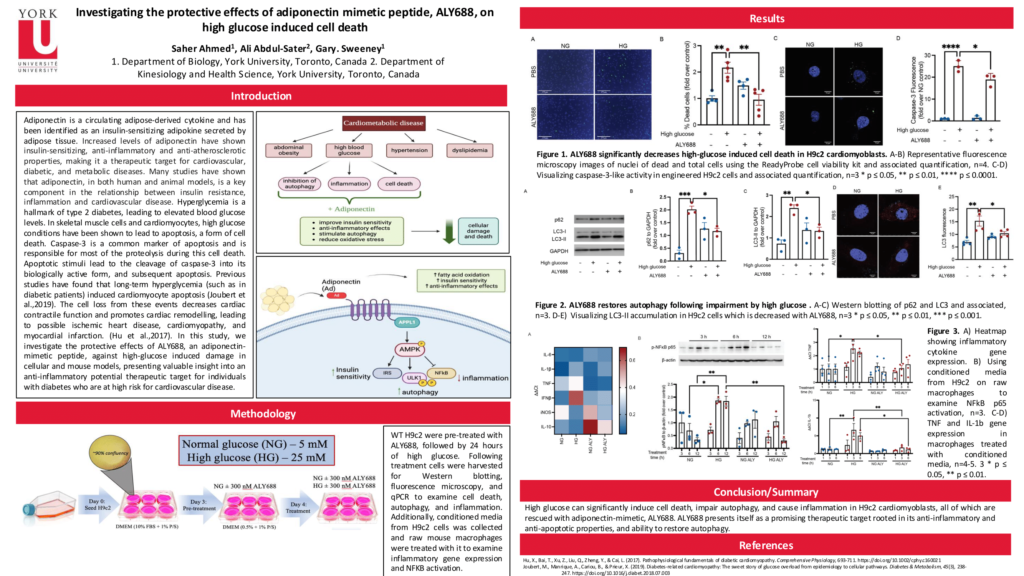Saher Ahmed
Canada
Investigating the protective effects of adiponectin mimetic peptide, ALY688, on high glucose induced cell death
Saher Ahmed1, Khang Nguyen1, Carina Tang1, Cindy Sung1, Ali Abdul-Sater2, Gary. Sweeney1
1. Department of Biology, York University, Toronto, Canada
2. Department of Kinesiology and Health Science, York University, Toronto, Canada
Abstract
Background
Cardiovascular complications in diabetes, termed diabetic cardiomyopathy (DCM), remains the leading cause of death in diabetic patients. Hyperglycemia, a key hallmark of this metabolic disorder plays a vital role in the pathogenesis of DCM. Hyperglycemia is the main trigger for metabolic changes in diabetes, and can promote insulin resistance, oxidative stress, apoptosis, and inflammation to contribute to the progression of cardiac damage and DCM.
Methods
In this study, we investigate the protective effects of ALY688, an adiponectin-mimetic peptide, against high-glucose induced damage in cellular and mouse models. H9c2 rat cardiomyoblasts were used to examine high-glucose induced cell death and associated mechanisms. H9c2 cells were pre-treated with ALY688 (300 nM) for 16 – 18 hours, followed by 24 hours of high glucose (25 mM) treatment. Following treatment, cells were harvested appropriately for downstream applications including Western blot, flow cytometry, confocal and fluorescence microscopy, and quantitative polymerase chain reaction (qPCR).
Results
Western blotting showed a significant increase in cleaved caspase-3 following 24-hour treatment under high glucose conditions compared to normal glucose (p<0.0001), indicating activation of apoptosis in heart muscle cells. This effect was also significantly attenuated with ALY688 and 24-hour co-treatment with high glucose (p<0.001). With this in mind, we investigated induction of autophagy as a potential mechanism through which ALY688 is exerting its protective effects. Western blot of LC3-II and p62 showed inhibition of autophagic flux under high glucose conditions, while co-treatment with ALY688 led to increased autophagic flux. Furthermore, activation of NFkB pathway was investigated as a mechanism causing cellular stress. qPCR was employed to examine gene expression of various pro-inflammatory cytokines. We found a significant increase in IL-6, IFNb, iNOS, and TNF in cells treated with high glucose (p<0.001), which was reduced with ALY688.
Conclusions
This study will provide valuable insight into an anti-inflammatory potential therapeutic target for individuals with diabetes who are at high risk for cardiovascular disease.


Leave A Comment